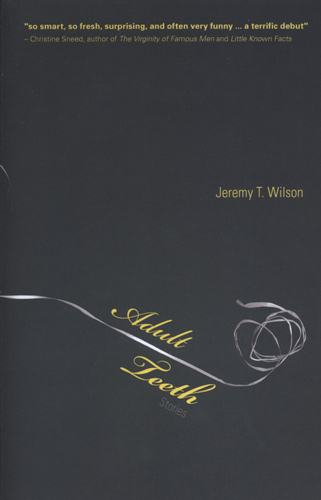Adult Teeth
Domesticity at its finest, or worse. Whatever it is, Jeremy T. Wilson makes sure that the reader has a nice, comfortable spot on the couch of these unhappy homes before bulldozing them. Adult Teeth is a book for any adult who has ever considered cheating on his or her spouse, a what-not-to-do guide for divorcees and potheads that wonder what being an alligator might feel like.
Domesticity at its finest, or worse. Whatever it is, Jeremy T. Wilson makes sure that the reader has a nice, comfortable spot on the couch of these unhappy homes before bulldozing them. Adult Teeth is a book for any adult who has ever considered cheating on his or her spouse, a what-not-to-do guide for divorcees and potheads that wonder what being an alligator might feel like.
I can’t remember the last time that a book made me laugh so loud. It’s not that each story is jam-packed with knee-slappers, but rather, each joke is dark, and annoying, and you’d almost rather burn the pages than have to face the reality of them.
“Trash Days” is a tale about a woman who is certain that her out-of-work husband has purchased a sex doll. Of course, whenever she asks whether or not this is true, he says that it’s not. A funny, classic cycle in and of itself; however, I find this smaller detail hilarious: the couple, Walt and LeAnne Cox, have sex every Saturday because “they both believed keeping a schedule was better than not having sex at all.”
The humor in Adult Teeth, though, is merely a distraction from the underlying theme of sadness. It is as if most of the characters wear rain clouds as hats, and they do and say things with the intent of ditching them, but the clouds never completely go away. They may stop raining for a moment, but in the end, there are still weird, gray puffs on top of their heads.
Take “It Don’t Get No Better Than This” for example: the protagonist, Peeps, keeps thinking about what someone once told him during a baseball game, “Win or lose, it don’t get no better than this.” This little seed inside of his mind drives him mad, because even when something positive occurs, it’s nullified by the idea that that’s the climax of existence, instead of the thoughtful state of nowness that this maxim was supposed to induce. Peeps spirals into depression, and the only fix, he thinks, is by doing something radical. SPOILER ALERT: even “something radical” doesn’t help much.
I have a feeling that the Dylan Thomas poem “Do not go gentle into that good night” had an influence on Wilson’s characters. Many of the stories end in explosion, people reaching their breaking points. And even better, this is balanced by the number of stories that end without ending, where the reader is left scratching their head, puzzling over their own ability to read properly. Both styles are executed flawlessly, and speaking of endings, the last tale in Adult Teeth takes an amazing, surreal turn reminiscent of Luigi Serafini’s Codex Seraphinianus. The fact that Wilson can jump from the mundane to the magical, and somehow keep them both undeniably his proves that he is an author who cannot and will not remain shackled by what is “supposed to be.”
I’m very interested in his use of the Bloody Mary as a motif for waiting. There are only two occasions in which his characters drink this breakfast cocktail, and each time, they are stuck waiting for other people. I think that it makes sense, too, because when does one typically order a Bloody Mary? In the morning. And with the morning comes all these hopes and dreams for the day ahead, although most of the time they tend to fail us. If Adult Teeth is about one thing, it’s about failed expectations.
My only criticism would be that the language used throughout the collection was relatively colloquial. It seemed that “poetics” didn’t play too big of a role in the book, which is absolutely fine, and it worked. But I do think that Wilson could have had a little more fun toying around with the boundaries of the alphabet. That being said, let us not forget that the term “strawberries and buttholes” is, indeed, written somewhere within those 244 pages (page 161 to be exact).
The collection is full of dogs and parrots, chopsticks, babies and children that will never grow up. In this exciting book, Wilson breaks up the tedium of everyday life. Contemporary fiction “don’t get no better than this,” but don’t quote me, or anyone else on that because no one wants to wind up in an empty parking lot, carrying an Indian mascot, like Peeps.





